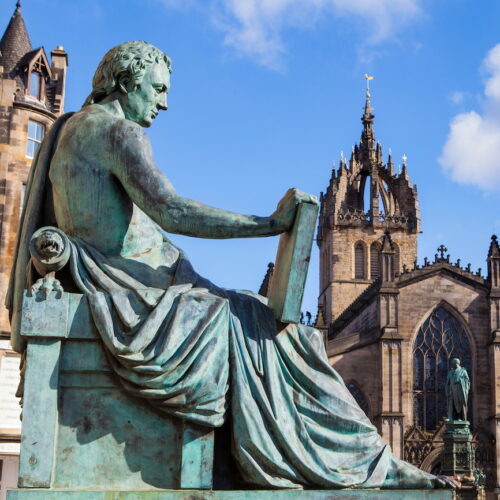ON TUESDAY 11th August, Dr Stuart Waiton, at a ThinkScotland meeting, spoke of the need for our teachers to believe in civilisation if they were to educate with authority. I suddenly realised what differentiates the Chinese teachers I know from those western counterparts, unless they are motivated by religion: a belief that ‘the best of what has been thought and written’ matters, and must be shared with all children equally.
Listening to Waiton, I realised that irrational ideologies such as, but not only, Woke, were spreading because we have not found a consensus to replace that missionary destiny which animated the British for the last two centuries and replaced the various versions of Christianity which had been the official ideology for centuries before.
The ideas of the Scottish Enlightenment, which did so much to fructify intellectual life everywhere and were arguably the foundations of the scientific and industrial revolutions, the political settlements throughout the English speaking world and the social sciences, became overshadowed by the sense of missionary destiny, so well exemplified by the writer of ‘The English Speaking Peoples’, which animated thousands of Scots running the empire or, later, fighting against fascism.
In the 75-odd years since WW2 and the dissolution of the empire, that missionary destiny has slowly become perverted into the guddle of beliefs and imprecations that we shorthand as ‘Woke’. Joanna Williams has detailed what ‘Woke’ amounts to. Many of our compatriots like this ideology because it makes us seem gey important still, spreading our ‘progressive’ ideas everywhere and forcing our own people to conform. It is the ideology of the New Class just as Communism as practised was the ideology of Eastern European administrators before the fall of the USSR. Nazism in 1930s Germany was taken up not by the working classes or peasantry, but by lawyers, teachers, university lecturers and civil servants, the lanyard class of those days. The virus of a new ideology is a naturally occurring phenomenon; when there is a gap in authority, a new class pushes in, justifying itself with a religion or ideology. ‘Woke’ is simply missionary destiny reconfigured.
Far from being progressive, Woke is reactionary in that it reinstates prescriptive identities, encourages class and ethnic prejudice and authorises a caste of commissars or priests to tell us how to think.
The only alternative to this ideology is, as Waiton implied in the context of schools, a belief in civilisation. Although we humans have a yen for believing in the unbelievable, intelligent and educated people are not going to return to the Christian churches. That is not to say that religions old and new will not gain adherents. The missionary destiny, backed by protestant churches, has lost attraction and for many this leaves a hole in their lives. Scots girls will put on the hijab, Welsh boys will sing the Tridentine mass, cockneys will turn into druids; but none of this will be mainstream, because for most of us Darwin and Dawkins have rendered the supernatural ridiculous.
No, the answer is in what Waiton said: a belief in civilisation. Where better to start than in Scotland, where our forebears invented the modern world?
Scottish Enlightenment thinkers brought to the modern world the idea that we are the creatures of our environment, a function of nature, not its overlord. Morality arises from human aspirations rather than divine ones.
The thinkers invented the very idea of progress and the realisation that it came about because of changes in the means of production. The word civilisation was their creation. The idea that civilisation was a process and that all human beings were equally able to achieve it was born and, so too, the equality of man and therefore that slavery was unacceptable. Scots were the prime movers in anti-slavery and in the first Reform Bill.
Enlightenment thinkers preceded Johann Gottfried Herder and Karl Marx in recognising the cultural costs of capitalism at the same time as acknowledging that commercialisation drives progress.
Arthur Herman writes of the Scottish Enlightenment thus: “For nearly 100 years main cultural current in Britain had flown from south to north. Now it reversed itself. Out of Scotland came thinkers, politicians, inventors, and writers who would restore Britain’s self-confidence, and equip it with the tools to confront modernity on its own terms. They remade its politics. they galvanized its intellectual and educational institutions; they gave it a new self-image and new sense of its place in history.”[1]
Can we not do the same again? First, awaken Scotland to its remarkable role in the development of modernity, then reinvent Scotland as the Thought Leader of Europe once more, by rooting our identity in those great achievements, which, after the disappointments first of socialism and then of nationalism, are so clearly the great contribution of Scotland to humanity?
We need politicians who will speak proudly about that, and, as Stuart Waiton suggests, we need to start by reforming the teacher training colleges.
Established in 2006, ThinkScotland is not for profit (it makes a loss) and relies on donations to continue publishing our wide range of opinions – you can follow us on X here – like and comment on facebook here and support ThinkScotland by making a donation here.
[1] Herman, Arthur (2003) The Scottish enlightenment: The Scots’ invention of the modern world London: Harper Collins p256
David Hume statue and St Giles Cathedral, Edinburgh, by chrisdorney rom Adobe Stock










